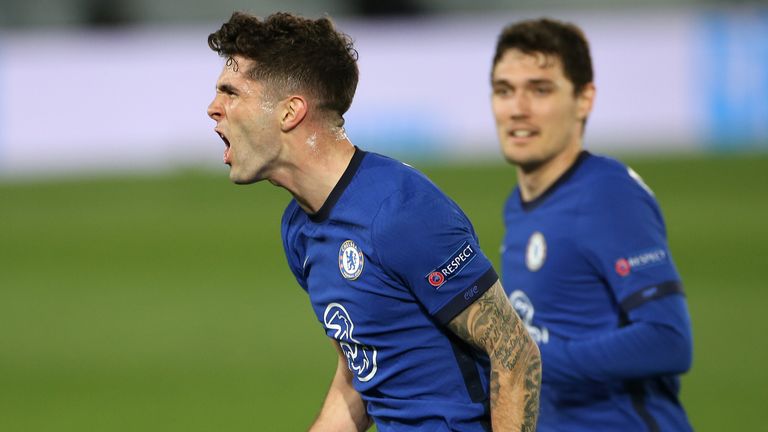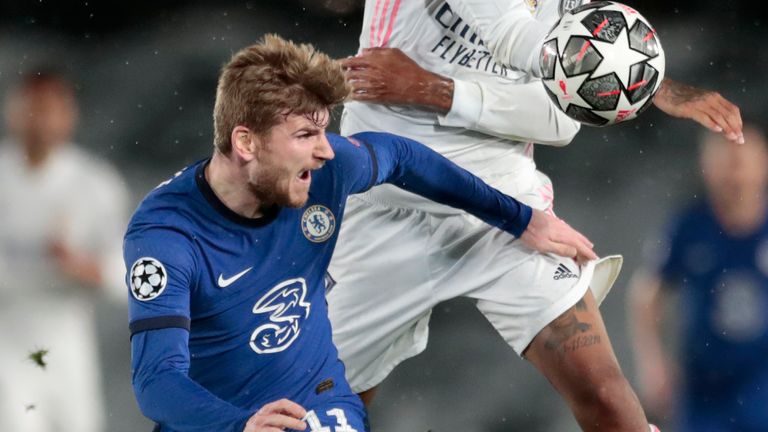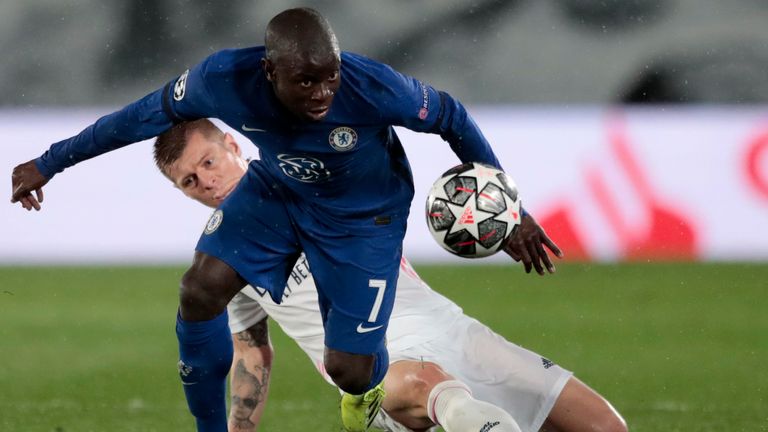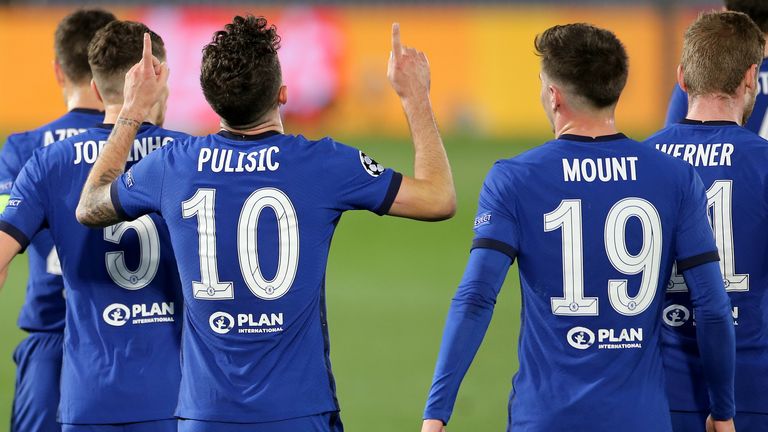Real Madrid 1-1 Chelsea: Thomas Tuchel gets his team selection and tactics right to give Blues Champions League edge
Christian Pulisic's goal was cancelled out by Karim Benzema but Chelsea have the edge on Real Madrid after a 1-1 draw in the first leg of their Champions League semi-final; Thomas Tuchel won the tactical battle and got his team selection right too
Wednesday 28 April 2021 11:55, UK
Chelsea were outstanding from start to finish against Real Madrid on Tuesday night, the 1-1 draw making them favourites to advance to their first Champions League final since 2012. But you wouldn't have guessed it to look at Thomas Tuchel.
The 47-year-old cut an agitated and, at times, exasperated figure as he prowled his technical area at the Alfredo di Stefano stadium, urging his players to raise their intensity and throwing his hands up in frustration when passes went astray or moves broke down.
Tuchel is forever demanding more but his Chelsea players appear to be responding. Just three months into his tenure, he has them on course for a top-four finish in the Premier League, an FA Cup final and perhaps even the biggest prize of them all.
It has been a remarkable transformation - Chelsea's season appeared at risk of drifting when he took over from Frank Lampard in January - and Tuesday's performance was a perfect illustration of Tuchel's role in it. His team selection and tactics were perfect for the occasion. It is becoming a regular occurrence in the big games.
- Real Madrid 1-1 Chelsea - Match report and player ratings
- Tuchel: Werner missing big chances does not help
- How the teams lined up | Match stats
Pace stretches Madrid defence
Tuchel named an unchanged starting line-up for the first time since his appointment, with Timo Werner once again leading the line, flanked by Christian Pulisic and Mason Mount.
Trending
- Qatar GP: Leclerc fastest from Norris in only practice LIVE!
- Premier League build-up LIVE! Pep: We have no squad - rebuild is needed
- PL Predictions: More bizarre results? Saints to win at Brighton
- Transfer Centre LIVE! Cunha to stay at Wolves in January, says O'Neil
- Man Utd latest: I believe in Mount, says Amorim
- Where does Salah rank among Premier League's greats?
- The title race is over if Liverpool beat Man City, isn't it?
- Premier League quartet on Puskas goal of the year shortlist
- Brighton vs Southampton live on Sky preview: Dunk back for Seagulls
- Arsenal latest: Arteta gives Gabriel injury update
Real Madrid had switched to a back three to match up Chelsea's shape but the extra body at the back did little to help them in the first hour of the game. Instead, they were left chasing shadows due to the speed and movement of Chelsea's front three.
Chelsea were set up to spring forward as quickly as possible every time they won possession, with the intention of then picking out runners in behind the Real Madrid backline.
It worked perfectly for the goal, when Pulisic latched onto Antonio Rudiger's ball over the top, cut inside to elude the advancing Thibaut Courtois and fired home an emphatic finish.
Chelsea would already have been in front at that point had it not been for Werner's failure to convert from close range moments earlier.
The German's finishing remains erratic - much to Tuchel's frustration - but it is easy to see why he is preferred to Olivier Giroud or Tammy Abraham up front in this side.
Against Real Madrid on Tuesday night, as against Manchester City at Wembley 10 days ago, he was constantly on the move, his off-the-ball runs opening up gaps in the opposition defence and his intensity setting the tone for Chelsea's attacking display.
Werner, Pulisic and Mount weren't the only ones instructed to try and exploit Real Madrid's high line.
Cesar Azpilicueta's inclusion at right wing-back was viewed as a defensive move by Tuchel and he certainly helped Chelsea to contain the marauding Marcelo. But he could also be seen running in behind and the same was true of Ben Chilwell on the opposite flank.
The sheer number of players trying to spring the Real Madrid offside trap made them even more difficult for the hosts to pick up and in Rudiger, Thiago Silva, Andreas Christensen and Jorginho, there were plenty of players capable of finding them.
Tuchel configured his team perfectly to exploit an area of weakness in their opposition - and it worked.
Kroos and Modric controlled
When Liverpool faced Real Madrid at the same ground in the quarter-final earlier this month, their failure to get close enough to Toni Kroos and Luka Modric proved costly.
Real Madrid won the midfield battle emphatically that night and Kroos, in particular, was able to dictate proceedings, not even misplacing a pass until the 34th minute.
Madrid's midfielders were not afforded the same luxury by Chelsea. In fact, the game was not even a minute old when the usually unflappable Kroos misdirected his first pass under pressure, allowing Azpilicueta to intercept. Chelsea started aggressively and continued in the same way.
Tuchel was happy to allow Kroos and Modric to have possession in their own half, where they could not hurt Chelsea, but every time they moved forward they had to contend with N'Golo Kante snapping at their heels or Mount shadowing their every move.
Kroos and Modric were instrumental in providing the ammunition for Vinicius Junior against Liverpool but that supply line was cut off by Chelsea, with the duo only finding him five times between them before his 66th-minute withdrawal.
Chelsea were unable to stop Karim Benzema from scoring the equaliser from a smartly-worked set piece, but the manner in which they shackled Kroos and Modric was crucial in negating Real Madrid's threat from open play.
Zinedine Zidane's side rarely threatened over the course of the 90 minutes and Benzema's outstanding effort for the goal was their only shot on target all evening.
Ziyech, Havertz provide boost
Tuchel also made intelligent use of his substitutes.
When Werner and Pulisic were tiring in the second half, Kai Havertz and Hakim Ziyech were sent on in their places.
Havertz and Ziyech do not offer the same level of pace as the men they were replacing, but Tuchel knew the game demanded something different at that point.
Instead, their passing ability helped Chelsea to control possession, ensuring Real Madrid were not able to crank up the pressure and force the visitors onto the back foot.
Tuchel still wanted to win the game and there were opportunities to do that thanks to some of the slick passing moves Havertz and Ziyech helped to orchestrate, but their presence was primarily designed to give them greater control when they needed it.
That control was such that Chelsea actually looked like the home side at times, enjoying around 50 per cent of the possession despite the scoreline being far more favourable to them than it was to Real Madrid.
Zidane's side were unable to gather any momentum as a result and they are not the first side to have found this Chelsea side so difficult to play against.
It will take a lot more than this to satisfy Tuchel, of course. He knows this tie is far from over. But it's becoming clearer with every passing game that Chelsea are in the right hands. A difficult season for the club could yet end on an incredible high.







